

05.07.2019
The company CFT has obtained the “Legal Source TM” certificate for its forestry activities in DRC.It’s an excellent news from this country where serious companies of the forest and wood sector are eagerly searching to improve their image.
Last May, the company the “Compagnie Forestière de Transformation” (CFT) has obtained the legal origin certificate “Legal Source TM” for their forest management and logging operations in the concessions that have been attributed to them near Kisangani in the province Tshopo (Ubundu district), and for their transformation activities.

It’s the first third party verified legality certification in DRC, since the stopping on certification activities in 2011, although a first company had obtained a “Timber legality” certificate from SGS in 2006. DRC suffers from a lacking image with regard to forest governance, because of several illegal logging cases and an instable political climate. It has been 16 years since the Democratic Republic of Congo decided to halt new attributions of forest concessions. The reason behind is to first clean up the forestry sector in order to avoid anarchy and corruption. Simultaneously, the country has started negotiations with the European Union since 2011, to obtain signature of an VPA FLEGT. Two legality grids and a legality verification system (key elements of a VPA), have been presented to the parties in June 2019. Official negotiations had slowed down, but the intention is to relaunch them.
CFT started its process towards legality certification several years ago, investing in human resources and equipment to obtain the required level of compliance. During the process WWF provided assistance towards the required level, and to finish the company decided to choose the Legal Source standard, proposed by NEPCon.
Karim Ammacha, the general director of the company, explains that the biggest challenge in the process was to evolve behaviour and habits of the workers, which was obtained also through contributions of the AGEDUFOR project. He adds that “financially, it is very difficult to support the costs related to the requirements of certification, except for sustainable forest management which merely costs more than a strong willingness”.
Obtaining certification is part of the middle and long-term strategy developed by the company. “For the moment, the certificate only provides proof of the legality of our production”, explains the general director, “but our goal is to further develop industrial activities and produce final wood products, and guaranty a second rotation based on the secondary species. We started, for example, a small-scale production of planed Limabali.” He’s convinced that certification will be fruitful to final products.
He hopes that the CFT certificate will motivate the Congolese forest and wood industry in to take initiatives which will improve the image of the forest production in DRC.
Currently, ATIBT puts in place activities to stimulate forest certification initiatives in DRC, by means of the installation of a FLEGT-Certification referent at its partner organisation the Wood industry federation (in French: FIB), and through the projects FLEGT-IP (UE) and FLEGT-Certification (PPECF-COMIFAC).
The stake is to identify candidate companies for the coaching support by PPECF to obtain third party certification. No doubt that this first certificate obtained by CFT will motivate other initiatives.